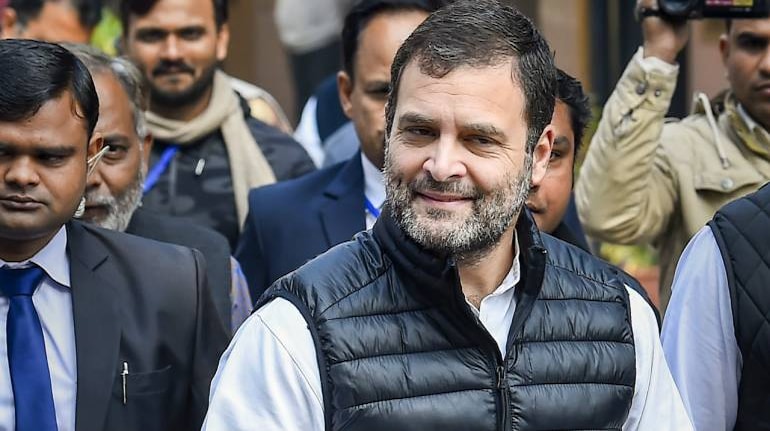
Governments are trying to "manage the perception" about coronavirus infections and give a sense that the problem is not as bad as it is, Congress leader Rahul Gandhi said on Wednesday, asserting that it is important to accept the problem and fight it.
On Doctor's Day, he expressed solidarity with health workers and described them as "a nonviolent army" risking their lives to save people from the coronavirus pandemic.
He was in conversation with four Indian nurses working in New Zealand, Australia, the UK and India and heard their experiences and said people stood with them in these times of crisis.
Gandhi, in his 30-minute conversation with Anu Ragnat (working in New Zealand), Narendra Singh (Australia), Sherlymol Puravady (the UK), and Vipin Krishnan (working in AIIMS, Delhi) -- discussed the impact of working in a COVID-19 environment on their family lives.
He also asked how their families were coping with the fear of being infected as they were dealing with COVID-19 patients and how their governments were treating them.
This was part of the series of conversations that the former Congress president is having on coronavirus. He has earlier talked to experts in the field.
Gandhi claimed that testing is not being allowed in many Delhi hospitals. He also gave an assurance that he will write a letter to authorities concerned to expedite grant of compensation to healthcare workers, as announced by the Delhi government to those who died due to COVID-19.
"One of the doctors of a private hospital I was speaking to was telling me that it becomes impossible for them to work if they cannot test COVID patients. If they don't know if the patient has COVID or not, they don't know where to put him," he said.
Gandhi said the doctors feel completely frustrated about how to move forward faced with the dilemma of putting two patients, one who has COVID and one who doesn't, next to each other.
"The governments are trying to manage the perception, they are trying to give a sense that the problem is not as bad as it is. But I believe that we have to face the problem, so we should accept the problem, define the problem accurately and then fight the problem," he said.
Krishnan, who had tested positive for COVID-19 and has now recovered, rued the sad state of affairs in Delhi and the low levels of testing in the face of rising cases.
He also raised concerns over compensation to the families of COVID warriors who died fighting the pandemic.
"Two nurses have died in Delhi, they were from South India. One X-ray technician. One retired doctor from AIIMS passed away and one person serving in the sanitation department, we lost him unfortunately. However, they are yet to receive the compensation of Rs 1 crore announced by the Delhi government," Krishnan said.
"It is not that we can give some amount of money and compensate the death. It is not that, but at least we should support the families. The government should do something for them," he said.
Krishnan also urged Gandhi to take up the issue of risk allowance for nurses and doctors at this point of time as lives were being lost in fighting COVID-19.
"We are exhausted and we are fighting in the front line without any fear. We will win. You and the government are with us. I have complete faith that we will fight this war against the coronavirus and win," the AIIMS nurse said.
He also said there was a sea of difference between government hospitals and private hospitals in India, as some private ones were cutting salaries of healthcare staff.
"Private nurses are saying that their salaries are being cut. How will they care for their families during this pandemic? In such a situation, I think the government must help them and pay their entire salaries. In this condition, it is difficult for them to survive," he noted.
In contrast, the nurses working abroad said their governments were providing special packages and risk allowances for frontline health workers like them.
Lauding the role of nurses, Gandhi said he wanted them to get a sense that as a community they should feel that all are with you.
"We understand that you are doing a dangerous job. We understand that this is not an easy job. We understand that you are putting your lives on the line for this and we appreciate greatly what you are doing all over the world and in India," he said.
Narendra, a health worker from Rajasthan's Sikar, who is working in Australia, said health workers need to wash their hands repeatedly and properly put the PPE gear to avoid getting infected. He also expressed concern over many health workers in India getting infected with the virus while treating patients.
Discover the latest business news, Sensex, and Nifty updates. Obtain Personal Finance insights, tax queries, and expert opinions on Moneycontrol or download the Moneycontrol App to stay updated!